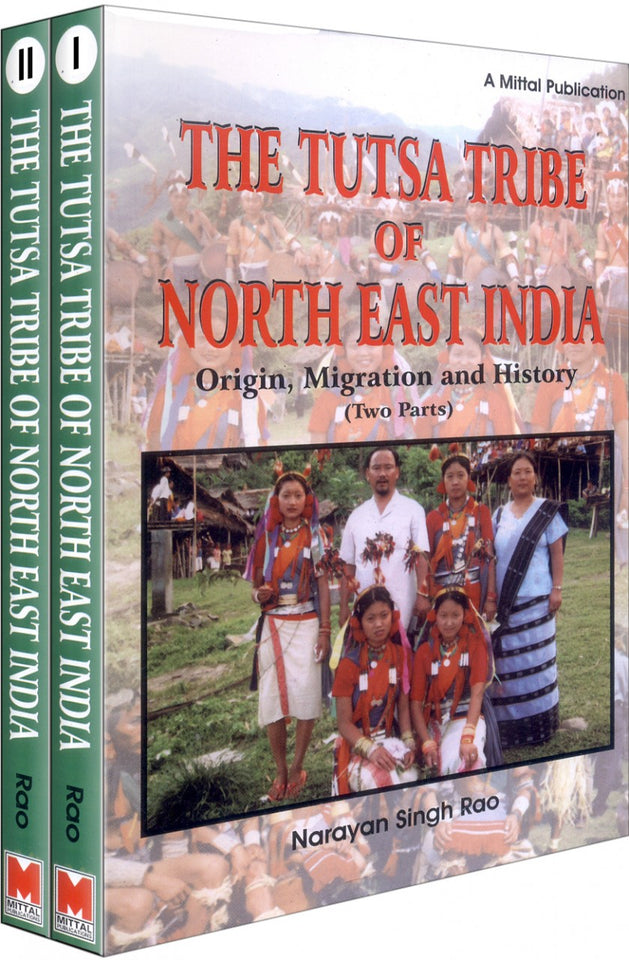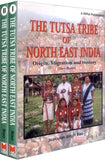The Tutsa Tribe of North East India ( 2 Parts)
Regular price
Rs. 1,800.00
The present volume based on extensive survey, field work conducted in the villages of Northeast India, study of the Ramayana, the Mahabharata, the Puranas and published and unpublished material will go a long way in accelerating the process of construction of the history of tribal communities of Northeast India, which has so far remained neglected by the historians. The study area, on the periphery, marks the confluence of great civilizations of India, China and Southeast Asia, with its intermingling of indigenous and alien cultures, even as remote as the American. The focus, however, remains steadily on the multifaceted life, mythology, history and socio-cultural heritage of the Northeast India. The present work has been divided into two parts, deals with great clarity, various village societies, geography, demography, festivals, rituals and social systems of the Tutsa Tribe. Chapter 1 gives information on geography, demography, ecology and natural resources of the study area. Chapters 2 and 3 give a comprehensive picture on the geology and process of creation of Northeast India in the Cretaceous period, development of human civilization and socio-economic and political development from the earliest times to the present. The role of tribal chiefs of NE India in the politics of northern India and their participation in the Mahabharata War is given due importance in these chapters. Chapter 4 gives an account of the Tribal mythologies and cosmogony with regard to the creation of human civilization. Chapter 5 gives details on History of the migration of the Tutsas of NE India. Chapter 6 deals with the nature of political relations of the Tutsas with the Ahom rulers and the Nocte, Tangsa, Singpho, Muttock, Laju and other tribes of Assam and East Arunachal Pradesh. Chapter 7 gives a comprehensive picture on the structure of village society and system of the governance of a village. Tutsa Tribal/Rural Economy is discussed in Chapter 8. Festivals and Rituals, Tutsa social system and institutions of governance and local administration find a place Chapters 9 and 10 which also extensively deal with tribal-clan solidarity and organization. Tutsa religious belief system, philosophy and forms of Divinity are discussed in Chapter 11. The entire study is summarized in Chapter 12.
Narayan Singh Rao, M.A., M.Phil, Ph.D. (JNU) was born and brought up in Udaipur (Rajasthan). He is a renowned Social Scientist, Development Expert and Professional Historian on International repute. He started his career in academics from the Jawaharlal Nehru University as Research Associate in 1991. He joined V.V. Giri National Labor Institute Noida (U.P.) as a Researcher in 1993 and subsequently worked with Bachpan Bachao Andolan & Global March against Child Labour, New Delhi as Executive Director. In 1996 he joined Department of Higher Education, Government of Arunachal Pradesh as Lecturer & Head of the Department of History. In 2003 Dr.Rao was appointed by Association for Voluntary Actions as Chief Coordinator SACCS-BBA Core project. Subsequently he was awarded Senior Fellowship by Ministry of Culture, Government of India and later on joined Mewar Institute of Management, Ghaziabad as the Director. Presently Dr. Rao is working as Director of the Institute of Management, Ghaziabad (U.P.). Dr. Rao has acquired expertise on contemporary Social and Economics problems such as human migratin, child/bonded labour, Gender related issues, internal Security, Terrorism, Tribal Culture, History of North East India, and Medieval Agrarian Economy of Rajasthan. He was awarded Doctoral and Post-Doctoral Fellowship by Indian Council of Historical Research at the Centre for Historical Studies Jawaharlal Nehru University, New Delhi. Dr. Rao also secured Senior Fellowship from the Ministry of Culture of the Government of India. He has successfully completed several major research and action oriented projects supported by Government of India, ILO, UNICEF, REHA Consortium and other individual donors. He has also organized and Participated in Several national and international seminars and workshops. His three books entitled Rural Economy and Society (2002), Tribal Culture, Faith, History and Literature (2006) and Global Terrorism and Security (2009), have been published. Besides this, a large number of research papers authored by him are published in reputed national and international academic journals, magazines and newspapers. His comments on contemporary socio-economic and political problems and international affairs are posted by reputed media websites and newspapers. He is a Life Member of North East India History Association (NEIHA), Annual Member of Indian History Congress (IHC), Founder Member Institute of North East India Studies, Kolkata, Associate Member of United Services Institution of India (USI), New Delhi, Member, Academic Council, Mewar University, Chittorgarh and President of India Development and Education Initiative (IDEI) New Delhi. The main areas of his interests are Medieval Indian History, Culture and History of the People of North East India, History of South East Asian Countries, Terrorism & Internal Security, Governance, Human Rights and other contemporary issues.
Guaranteed Safe Checkout





